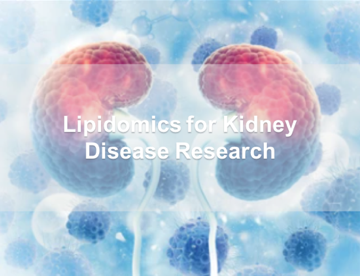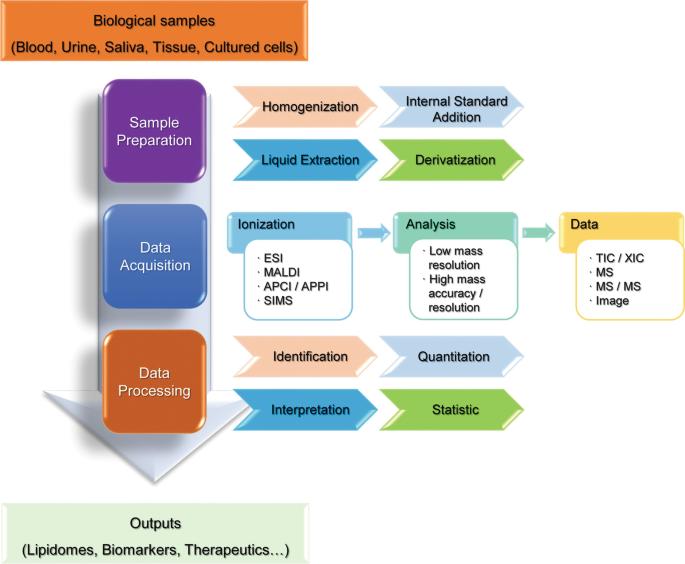Lipidomics for Kidney Disease Research

Chronic kidney disease (CKD) has become a major global public health problem. cKD can lead to premature death due to accelerated cardiovascular disease and various other complications.
Lipids play an important role in the regulation of normal kidney function and in the pathogenesis of kidney disease. Studies have shown that the overall structure of the distribution of free fatty acids between fatty acid oxidation and complex lipid fatty acid composition is an important driver of CKD progression, which is associated with metabolic dysregulation. dyslipidemia associated with CKD is the result of complex interactions between genetic, environmental and kidney-specific factors. Understanding the role of lipids in the network can facilitate the exploration of mechanistic insights into the mechanisms associated with renal disease. Analysis of key lipid mediators has become an important tool for basic research, diagnosis, prognosis and treatment of renal diseases.
Understanding the mechanisms of lipid dysregulation in CKD is challenging due to the diversity of lipid structures. The development of mass spectrometry has expanded the precision and depth of identification of complex lipids. MS-based lipidomics allows systematic identification and quantification of lipid species from biological systems.
With extensive experience and a state-of-the-art platform, Creative Proteomics offers customized lipidomics solutions that contribute to mechanistic studies of kidney disease research and drug development.
Featured services
Strategies for Lipidomic Analysis of Kidney Diseases
Creative Proteomics designs experimental programs according to customer needs and chooses different technical methods to improve detection efficiency and ensure the accuracy and repeatability of experimental results.
Based on LC-MS/MS technology to simultaneously analyze hundreds of different lipids in biological samples to obtain more information. Through bioinformatics data analysis, we can systematically elucidate the variation at the lipidome level and the regulatory mechanisms in the experimental group compared to the control group from a lipid perspective.
Targeting specific lipid molecules and their metabolites in samples. Based on high-resolution mass spectrometry and isotope internal standard, we use parallel reaction monitoring (PRM) targeted analysis technology, which can realize the specific acquisition of signals of multiple lipid molecules (such as dozens of target lipid molecules) at the same time, and obtain their absolute contents to meet the needs of targeted detection and verification of target lipids. Using Orbitrap mass analyzer and ultra-high resolution mass spectrometry, high quality data can be obtained. Sensitivity up to ppm level and linearity range up to 5-6 orders of magnitude.
Technology Platform for Lipidomics Service
Gas/Liquid chromatography hyphenated to high resolution /high accuracy mass spectrometry for untargeted lipidomics
TriVersa Nanomate nanoelectrospray ion source+ Orbitrap instruments.
 Lipidomics Analysis Process (Wang et al., 2021)
Lipidomics Analysis Process (Wang et al., 2021)
Advantages of Lipidomics Services
- Experienced in sample pre-processing and can handle a wide range of tissue cell samples
- Multi-isotope internal standard calibration, including QC and other multiple quality control systems to make the quantitative more accurate
- Suitable for complex matrices, more metabolite and metabolic network information can be obtained in a single test
- Professional data analysis, able to perform PCA, OPLS-DA, T-test and other analysis on the data
Sample Guidelines
Serum or plasma ≥ 200uL/sample
Urine ≥ 200uL~ 1mL/sample
Collected urine samples must be frozen immediately to inhibit any biological and abiochemical reactions.
How we work in 7 easy steps

If you have any questions about our lipidomics services for kidney disease research, please contact us.
Reference:
- Wang, Y. (2021). Applications of Lipidomics in Tumor Diagnosis and Therapy. In Lipid Metabolism in Tumor Immunity (pp. 25-39). Springer, Singapore.
* Our services can only be used for research purposes and Not for clinical use.



 Lipidomics Analysis Process (Wang et al., 2021)
Lipidomics Analysis Process (Wang et al., 2021)